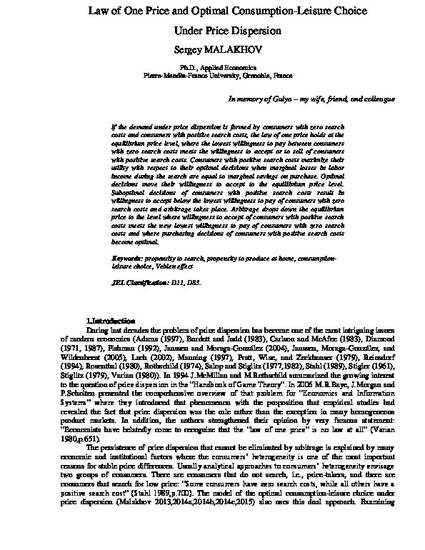
Article
Law of One Price and Optimal Consumption-Leisure Choice Under Price Dispersion
Expert Journal of Economics
(2016)
Abstract
If the demand under price dispersion is formed by consumers with zero search costs and consumers with positive search costs, the law of one price holds at the equilibrium price level, where the lowest willingness to pay between consumers with zero search costs meets the willingness to accept or to sell of consumers with positive search costs. Consumers with positive search costs maximize their utility with respect to their optimal decisions when marginal losses in labor income during the search are equal to marginal savings on purchase. Optimal decisions move their willingness to accept to the equilibrium price level. Suboptimal decisions of consumers with positive search costs result in willingness to accept below the lowest willingness to pay of consumers with zero search costs and arbitrage takes place. Arbitrage drops down the equilibrium price to the level where willingness to accept of consumers with positive search costs meets the new lowest willingness to pay of consumers with zero search costs and where purchasing decisions of consumers with positive search costs become optimal.
Keywords
- equilibrium price,
- consumption-leisure choice,
- cost of search,
- price dispersion,
- willingness to pay,
- willingness to accept
Disciplines
Publication Date
Spring March 6, 2016
DOI
http://economics.expertjournals.com/23597704-401/
Citation Information
Sergey V. Malakhov. "Law of One Price and Optimal Consumption-Leisure Choice Under Price Dispersion" Expert Journal of Economics Vol. 4 Iss. 1 (2016) p. 1 - 8 ISSN: 2359-7704 Available at: http://works.bepress.com/sergey_malakhov/14/
